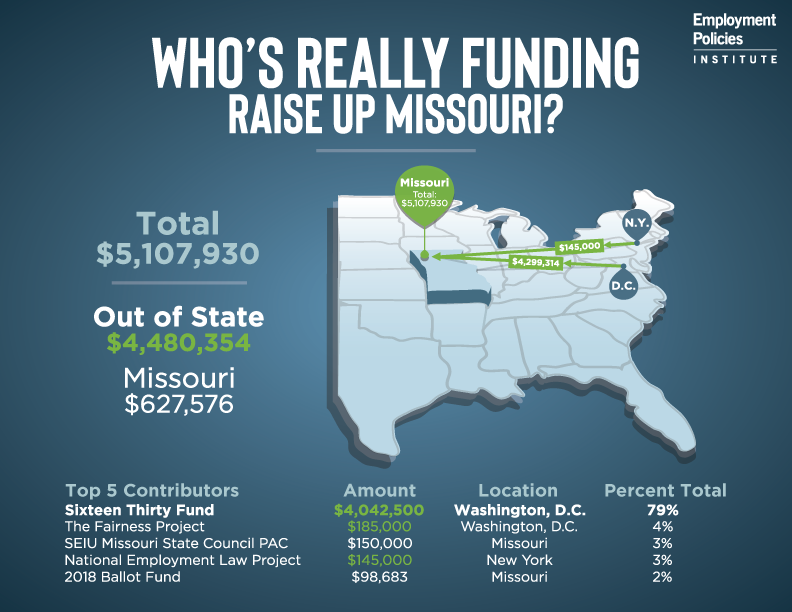This November, Missouri voters will have the option to vote “yes” or “no” on proposition B, a ballot initiative that would increase the state’s minimum wage from $7.85 to $12.00 in 2022 (a 52 percent increase). The “local” group supporting this initiative, “Raise Up Missouri”, isn’t very local after all – 87 percent of its funding coming from dark money organizations based in New York and Washington D.C.
Raise Up Missouri has received a total of $5,107,930 in named contributions. Of this, $4,480,000 has come from out-of-state, with only $627,000 (12 percent) coming from Missouri based individuals or organizations.
The east coast funding apparatus behind “Raise Up Missouri” is headlined by the D.C. based 501(c)4 organization called the Sixteen Thirty Fund. According to reports from the Missouri Ethics Commission, the Fund has given over $4 million to Raise up Missouri, including this $3 million check from August 31st.
It’s difficult to know who’s funding the Fund; donations to the Sixteen Thirty Fund are anonymous. At least some of the money comes from labor unions: An article in the Washington Free Beacon last year reported that the group has received over $860,000 from four labor unions in from 2015 to 2016, and federal filings show that this number rose to $2,235,000 in 2017. We won’t know the extent of their 2018 funding until the end of the year.
Looking past the dark money funding the minimum wage mandate, voters should know what the actual cost of a minimum wage mandate would be. A Missouri based think tank, the Show-Me Institute, recently released a study conducted by economists William E. Even of Miami University and David A. Macpherson of Trinity University which finds that approximately 11,000 workers would lose their jobs if the proposed minimum wage mandate is implemented.
Other Key highlights include:
- 32 percent of hourly workers who would receive a wage increase under the proposed hike would be individuals living at home with their parents.
- Only 19 percent of the workers who would receive a wage increase are in families with incomes below the poverty line.
- Only about 10 percent of workers who would receive a wage increase are single parents.
Proposition B is a poorly targeted policy proposal. No amount of money from out-of-state advocates can justify the economic costs Missouri will endure if it passes in November.


